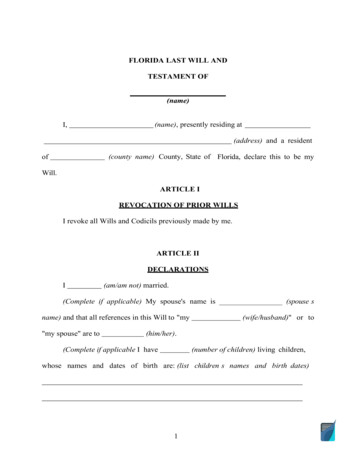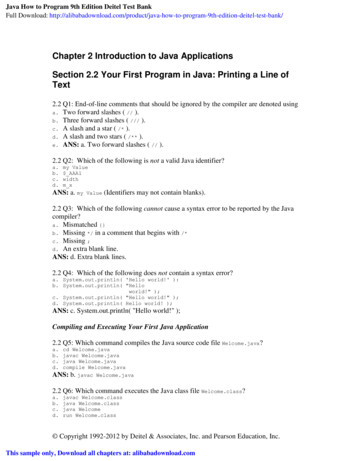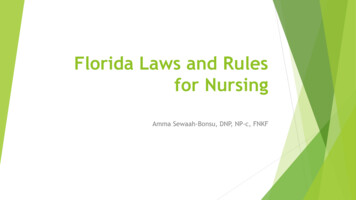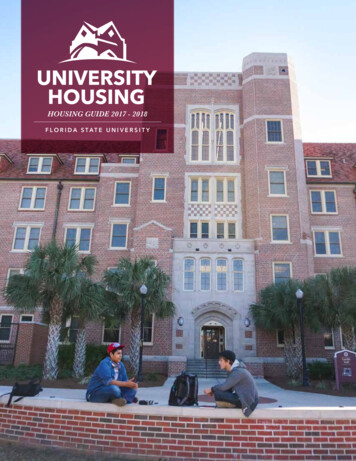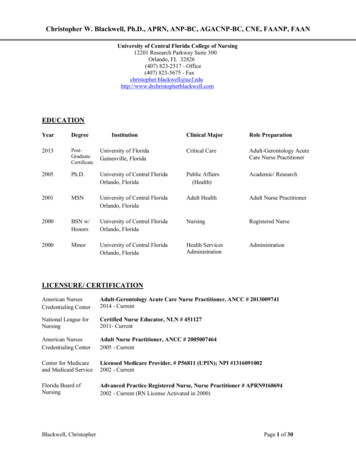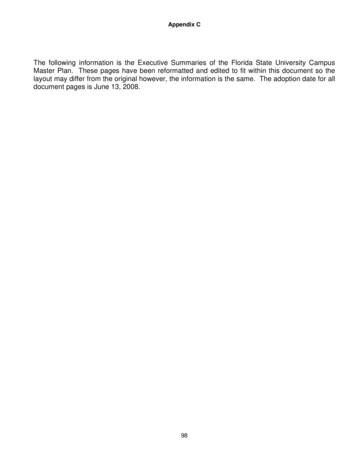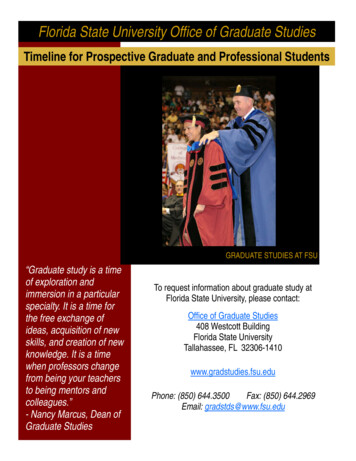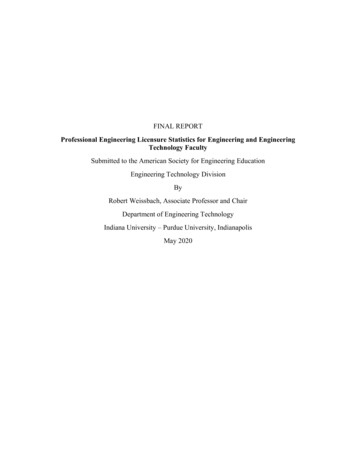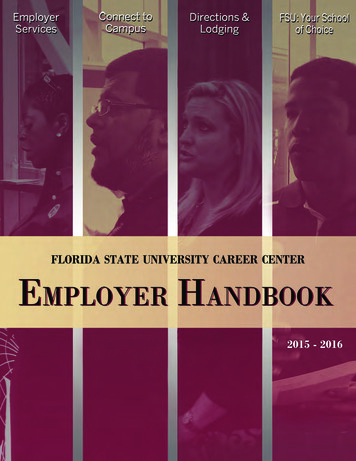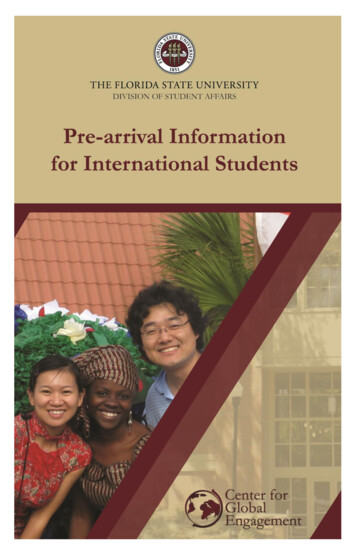
Transcription
WELCOME TO FLORIDA STATE UNIVERSITYCongratulations on your admission toFlorida State University (FSU)! We at theCenter for Global Engagement (CGE) arepleased that you will soon join ouruniversity community. This brochureprovides you with essential informationregarding your arrival at FSU. Please readit carefully and bring it with you to FSU .2
Table of ContentsORIENTATIONS & IMPORTANT DATES . 4STEP ONE – GETTING YOUR VISA . 5STEP TWO – PREPARING FOR TRAVEL . 7MAKE TRAVEL ARRANGEMENTS. 7IMPORTANT ITEMS TO BRING WITH YOU . 8STEP THREE – ENTERING THE U.S. . 9ENTERING THE U.S. 9ADDITIONAL SITUATIONS AT THE POINT OF ENTRY (POE). 10STEP FOUR – ARRIVING IN TALLAHASSEE . 11AFTER ARRIVING IN TALLAHASSEE . 11IN THE COMMUNITY . 12HEALTH & MEDICAL INFORMATION. 13Mandatory Health Insurance Registration Hold . 13Immunization Registration Hold . 14FINANCIAL MATTERS . 15Financial Assistance . 16Financial Needs upon Arrival . 16Tuition . 17HOUSING . 18University Housing . 18Private Residence Hall . 19Off-Campus Rental Units . 19Other Off-Campus Housing Tips . 20Southern Scholarship Foundation . 20Hotel Information . 21CLIMATE & WARDROBE . 21INTERNATIONAL STUDENT ORGANIZATIONS . 22CHILD CARE & EDUCATION . 22GET TO KNOW THE FSU CAMPUS . 233
ORIENTATIONSUndergraduate Students: CGE Pre-Arrival Online Immigration Session (OIS):Watch before traveling to the U.S. Visit fla.st/1T55SWX or see theorientation website below. International Student Check-In at CGE:Complete as soon as you arrive at FSU. CGE International In-Person -students/newinternational-student-orientation FSU Undergraduate Student Orientation:For registration, see dos.fsu.edu/nsfp/Graduate Students: CGE Pre-Arrival Online Immigration Session (OIS):Watch before traveling to the U.S. Visit fla.st/1T55SWX or see theorientation website below. International Student Check-In at CGE:Complete as soon as you arrive at FSU. CGE International In-Person -students/newinternational-student-orientation Academic Department Orientation:Check with your department for details. Graduate School Orientation:For registration, see e-School-s-New-Graduate-StudentOrientation Teaching Assistant Orientation:The Program for Instructional Excellence (PIE) sponsorsUniversity-wide graduate student teaching assistant orientationseach fall and spring semester. For registration, see inings. Some departmentsrequire their own TA orientation.IMPORTANT DATES – Fall 2017Class registrationNew Graduate StudentsNew Undergraduate Students:August 21 – 27, 2017During FSU Student OrientationFirst days of Classes:Late registration ( 100 fee):Monday, August 29, 2017August 27 – 31, 20174
STEP ONE – Getting Your VisaNote: If you are already in F-1 visa status and transferring from another U.S. educationalinstitution to Florida State University, you do NOT need to obtain a new visa unless you aretraveling abroad and do not have a valid F-1 visa.Note: If you are a citizen of Canada, you do not need a visa to enter the United States.However, you still need to present a SEVIS I-20 form and a valid passport when you enterthe U.S. You must also present proof of payment of the SEVIS fee (I-901) paid at leastthree days before arriving at the Port of Entry.Verify the information on your I-20. It is very important that all of thepersonal information listed on your and your dependents’ (if any) I-20s matchespersonal information on the passport. If any personal information, particularlyyour name, on your I-20 is incorrect and/or does not match the information onyour passport, email CGE-NewStudents@admin.fsu.edu as soon as possiblewith scans of the I-20 and passport, and an explanation of the correctionneeded. We will send you a corrected I-20 as soon as possible. After you verifythe information is correct, keep all documents in a safe place. If you lose your I20 before your visa appointment, contact the Center for Global Engagementimmediately to make arrangements for a replacement.Take note of the “PROGRAM START DATE” indicated on yourI-20. If you cannot schedule an interview with a consular officer until after theprogram start date on your I-20 or have other difficulties in obtaining your visa,please contact the Student Services Coordinator at the Center for GlobalEngagement at CGE-NewStudents@admin.fsu.edu or 850-645-1424 as soon aspossible. You may need to have a new I-20 issued and, possibly, deferbeginning your program of study until the following semester.Pay the SEVIS fee (I-901 fee). At least three days before your visa interview,you must pay the required Student and Exchange Visitor Information System(SEVIS) fee at fmjfee.com. You will submit the I-901 form electronically andcan pay with a credit or debit card. Print the receipt generated aftercompleting the online payment and bring it to your visa appointment. Formore information about the SEVIS fee, see e Note: F-2 dependents are not required to pay this fee. Transferor change-of-level students do not need to pay this fee again.Visit tudent.html fordetailed information about the F-1 visa and application and appointmentprocesses, required documentation, processing times etc. Note: StartingNovember 1, 2016, eye glasses will no longer be allowed in visa photos.Visit the website of the U.S. consulate where you will apply for your visa forinformation about your visa application process. To find your local consulate, seeusembassy.gov/5
Make a visa appointment with the embassy or consulate responsible forissuing nonimmigrant visas for your area as soon as you receive your I-20form. Visa applications may be accepted by the consulate at any time andvisas may be issued up to 90 days before your program start date. Federalpolicy requires all applicants for initial visas to the U.S. to have a personalinterview with a consular officer. Certain categories of applicants mustundergo a security clearance. Most security clearances take fewer than 90days to complete, but some can take longer. These may be held due to thecommonness of your name, any changes to the spelling or order of yourname on previous visas or passports, your academic major, and/or yourcountry of origin or nationality. If given any questionnaires or additionalforms to complete, return these as soon as possible.Pay any visa application fees. U.S. embassies and consular offices havethis information on their websites.Attend your visa appointment and interview. Take all the documentsspecified on the consulate’s website. Most interviews take less than fiveminutes, so be prepared and organized: Answer all questions truthfully. Permanent resident relatives andprevious arrest records will not necessarily lead to a denial, butmisrepresentation of any facts can lead to a permanent bar from theU.S. Dress professionally. Bring translated copies of your academic records and be prepared totalk about your academic plans and aspirations in detail. Be prepared to speak about your future career goals and how a U.S.degree is important in meeting those career and personal goals. Keepin mind that these should be consistent with ties to your homecountry and with your intent to return home. Take any documentation that may help you provide evidence of ties toyour home country. Be knowledgeable about Florida State University, about your academicdepartment, and about your chosen field of study. Have all documents in order and well organized. You have a veryshort time to make the best impression on the consular officer. Before you leave the interview, make sure you receive all of youroriginal academic and funding documents back from theconsular officer.Check your visa for accuracy. When you receive your visa, make sure youhave received the correct (F-1, F-2 for dependents) visa type and that thenotation, if any, on the visa indicates the correct institution: “Florida StateUniversity.” Be sure you have received your I-20 form back from theconsulate.6
STEP TWO – Preparing for TravelNote: To avoid unnecessary expense and difficulties, do not make unchangeable travelarrangements until you have received your visa from the U.S. consulate. There may beunanticipated delays in the processing of your documents.Make Travel ArrangementsSchedule your flight to allow at least four hours between your arrival at theinitial Port of Entry into the U.S. and your connecting flight to Tallahassee.You will need sufficient time to pass through immigration and customsinspection and to change currency, if needed.Note: When making travel plans and when transiting through airports, be aware that theU.S. has four different time zones: Pacific, Mountain, Central, and Eastern. Tallahassee,Florida is in the Eastern Time Zone. Make sure to consult a time zone converter that takesinto account Daylight Savings Time, such as timeanddate.com/worldclock/converter.html.Plan to exchange money before arriving in Tallahassee. The TallahasseeInternational Airport does not have currency exchange services but does havean ATM.Prepare transportation from the Tallahassee International Airport.A taxi into the city costs 20- 30. Some hotels offer free transportation fromthe airport, which is a 15-minute drive from campus and the downtown area. Ifyou plan to stay at a hotel, ask about an airport shuttle when you make yourreservation. Taxis are available at the airport and usually waiting outside forcustomers (look for the “Ground Transportation” sign near the baggage claimarea). If you need to call a taxi, contact information for some Tallahassee taxicompanies is below:City TaxiYellow Cab850-575-7575850-999-9999The information above on taxis and rentals is for your convenience and is not anendorsement of these companies.Vehicle rentalsare available at theairport from major companies such as Alamo, Avis, Budget, Dollar Rent-ACar, Enterprise, Hertz, and National. You must make reservations inadvance to ensure availability of vehicles. Don’t forget to inquire about theage restriction for rentals. You must also have an international driver’spermit as well as a foreign driver’s license, your passport, and a major creditcard in your own name. Rental agencies generally require the primary driverto be at least 25 years of age.7
Important Items to Bring with YouThis brochure!Legal and medical documents. In your carry-on luggage you shouldbring: immigration documents, marriage and birth certificates, academicrecords, medical records, proof of immunizations, and a list of anymedications you are taking and/or carrying with you. Certain medications,including vitamins, may be confiscated if you do not have properdocumentation. Do not pack these documents in your check-in luggage,which may be lost or delayed.Travel health insurance. We recommend you purchase travel insurance tocover you until your U.S. health insurance begins. If you purchase FSUhealth insurance, it does not take effect until a few days before the start ofthe semester. For exact coverage dates of the University plan, please see theinsurance policy booklet on the University Health Services website atstudentinsurance.fsu.edu. Travel insurance will not meet the universityrequirements for insurance coverage required in order to enroll in classes.Money. During the first few weeks, you will have many expenses,particularly if you live off-campus and need to pay deposits and fees andpurchase furnishings. Bring a debit or credit card that can be used in the U.S. It is a good idea to bring some cash in small bills (no more than 300 in 20, 10, and 5 bills.) Traveler’s checks in U.S. dollars are also recommended in case ofemergency or a lost credit card. Be sure to keep the receipts in aseparate, safe location. Make sure you have money available to you in the U.S. to paytuition on time. FSU accepts Visa, MasterCard, Discover Card, and AmericanExpress cards for tuition payments. Tuition will be due within twoweeks after classes start. See the section on Financial Matters foradditional money information.U.S. residential address (even if temporary). While traveling to theU.S., you will be required to report a U.S. residential address to U.S.Immigration at the Port of Entry. If you are temporarily staying at a hotelor with a friend until you are able to make your own housingarrangements, be sure you have the address of your hotel or friendavailable to you.8
Important Notes:Do not take prohibited items on flights or into the U.S.The Transportation Security Administration (TSA) lists items that areprohibited on airline flights for security reasons: The U.S. Customs and Border Protection website has information about theitems you can bring with you to the U.S. and which items are you-go/prohibited-and-restricteditems.Place all valuables in carry-on bags. If you choose to lock your luggage, youmust use TSA-approved locks only, as TSA screeners will then have a specialtool to open and re-lock your luggage. If you do not have TSA-approved locks,the TSA screeners will break your locks to open your luggage for inspection,and your luggage will not be locked for the remainder of the trip.STEP THREE – Entering the U.S.Entering the U.S.At the U.S. Port of Entry (POE). The Port of Entry is the internationalairport or land border crossing where you first enter the United States. Whenyou pass through the immigration and customs checkpoint, you will be asked topresent the following: Valid passport with valid F-1 visa (visa not required for Canadiancitizens) Original, signed I-20 I-94 Arrival/Departure Record (if crossing a land border only) SEVIS I-901 fee receipt Funding information (to support the amount documented on yourI-20 form) Destination address in the U.S. (even if temporary). Do not use theaddress of your academic department or the Center for GlobalEngagement Customs Declaration formI-94 Arrival/Departure Record. The I-94 Arrival/Departure Record isan electronic record that you will retrieve online after you enter the UnitedStates. U.S. Custom and Border Protection (CBP) issues paper I-94 formsto anyone entering the U.S. by land.9
Retrieve your I-94 soon after arrival at cbp.gov/I94. Save it as a PDF fileor print out a hard copy for your records. Your I-94 is proof of lawfuladmission to the United States.Questions to Expect. The CBP officer will ask you the purpose of yourtrip to the United States. You will also be asked to provide informationabout your final destination (i.e., your school). It is important to tell theCBP officer that you will be a student. You must also travel with proof offinancial resources and your academic records, in case CBP asks for thisdocumentation.Document Inspection. The officers will inspect your documents andstamp the date of entry and write your visa status (“F-1,” “F-2”), and“D/S” (duration of status) in your passport.These documents, taken together along with the I-94, constituteproof of your legal status in the United States. If there are any errors inthe notations, let the CBP officer know right away. It is much easier to correct theproblem at the Port of Entry than it is later.Additional Situations at the POESecondary Inspection. If the CBP officer at the Port of Entry cannotinitially verify your information, or if you do not have all of the requireddocumentation, the officer may direct you to an interview area known as“secondary inspection.” Secondary inspection allows inspectors to conductadditional research to verify information without causing delays for otherarriving passengers. If the CBP officer asks to contact the Center forGlobal Engagement, the main phone number is 850.644.1702. Businesshours are Monday to Friday, 8:00 am to 5:00 pm. If you are asked tocontact the Center for Global Engagement after business hours, call theCenter for Global Engagement main line for after-hours emergencyinstructions.Form I-515. If the CBP officer believes your immigration documents areincomplete or erroneous, you may receive a form I-515 with an instructionsheet. If you do, come to the Center for Global Engagement as soon asyou arrive. Do not send any documents anywhere before consulting withone of our staff members, as the address provided for mailing the I-515varies. The form I-515 gives you only 30 days to remain in the U.S. legallyand provide proof of your visa status, so do not delay.10
STEP FOUR – Arriving in TallahasseeAfter Arriving in Tallahassee International Student Check-In at the Center for Global Engagement(CGE) as soon as you are able. We look forward to meeting you! At check-in,we will scan your important immigration documents. To complete yourmandatory check-in, you must bring all of the following documents with you tothe CGE (and the same documents for dependents, if any): Your I-20 Passport with valid U.S. visa inside I-94 printout (if available) Your local address and phone number in Tallahassee, even if onlytemporary (e.g., hotel, friend’s house, etc.) Emergency contact information for a relative or friendYou will not be able to register for classes until you have completedInternational Student Check-In. You can find our location on FSU’sonline map here: campus.map.fsu.edu/index.aspx?GME.Attend the CGE International In-Person Orientation. You will learn aboutFSU’s campus resources, maintaining your immigration status, succeeding as astudent at FSU, and living in Tallahassee at this mandatory orientation. Youmust attend this orientation before you can register for classes. For more dates,times, location, and registration, see our orientation page at w-international-student-orientation .Attend other required and recommended orientations.See page 4 of this brochure for more information. Register for classes. Undergraduate students will register for classes during theFSU Undergraduate Student Orientation. Graduate students should check withtheir departments about class registration. See page 4 of this brochure for newgraduate student registration windows.Make sure to register for a full course load. You can find the definition of a“full course of study” for international students at cge.fsu.edu (underInternational Students then Current F-1 Students, and then Enrollment).To avoid the 100 Late Registration fee, make sure to register for at least onecourse before the first day of the semester. If you will be employed at FSU, obtain your Social Security number(SSN). The U.S. government uses this number to identify wage earners for taxpurposes. You are only eligible for an SSN if you already have an offer ofemployment. For more information about the SSN, please request the11
Social Security brochure from the Center for Global Engagement or viewour website: cge.fsu.edu/about-us/resources. When you apply, be sure youget a receipt or letter from Social Security and provide a copy of this letterto your department so they can process your employment paperwork.(Students not receiving income are not eligible for a SSN.)IMPORTANT: Students admitted to the U.S. in F visa status may notwork off-campus for a wage, or engage in business, unless specificallyauthorized to do so by the U.S. Citizenship and Immigration Services(USCIS) or an F-1 advisor.In the CommunityUtilitiesIf you are responsible for connecting the utilities for your apartment orhouse, there are many ways to initiate service. Information on the options isavailable at talgov.com/you/you-customer-request-connet.aspx. If you donot have a Social Security number (SSN), you can use the fax/email or inperson options. In place of the normally-required SSN or driver’s license,you can use a copy of your passport information page. To initiate new utilityservice in person, go to the Customer Account Services office on the firstfloor of the Frenchtown Renaissance Center, 435 North Macomb Street,from 8 am to 5:30 pm, Monday through Friday. If you already have a SSN, avalid U.S. driver’s license, a credit card, and know the address where youwill reside, you can activate your City of Tallahassee utility account beforeyou arrive in Tallahassee and pay a deposit online.If you will live off-campus, you may need to have your utilities turned onbefore you can move in to your apartment. Make sure you plan your arrivalaccordingly to give you time to initiate utility service. For more informationon initiating new utility service, please visit the link above.TransportationYou will probably need to use the Tallahassee bus system (Star Metro),particularly during your first days in Tallahassee. FSU students can use thecity buses at no charge by showing the FSUCard to the bus driver (but onlywhile FSU classes are in session).City bus maps, schedules and mobile app are at starmetro.transloc.com. Ifyou do not yet have your FSU Card, you will pay 1.25 in exact change asyou get on the bus.NOTE: Buses do not operate from the airport.The bus system also operates campus shuttles. FSU has several differentroutes through campus and two night bus services. “Night ‘Nole” providestransport from campus and nearby apartments to nightlife areas in town.SAFE Connection provides transport on campus and to nearby on-campuslocations. For more information, visit transportation.fsu.edu/other-services.12
ParkingParking on campus is very limited and you will need a parking permit in orderto use the student parking lots. Parking and transportation fees are included inthe required tuition/fees and there is no additional charge for parking permits.For more information about how to obtain a parking permit, as well as links tocampus parking maps, visit transportation.fsu.edu/.Health & Medical InformationUnlike many countries, the United States does not have a national health caresystem. Healthcare costs, even for minor illnesses or accidents, can amount totens of thousands of dollars. In the U.S., it is customary for individuals to buyinsurance, paying a fee to “insure” oneself against having to spend a great dealof money in the event of illness or accident. Even then, most U.S. insuranceplans do not provide 100% coverage for an accident or illness. These planstypically require you to pay both a deductible (an initial amount from the bill)and a percentage of the remaining cost. Some insurance will only pay “usualand customary” charges, so bills which seem excessive to the insurer will not befully paid.Mandatory Health Insurance Registration HoldThe State of Florida requires all students to have adequate health and accidentinsurance before registering for courses. You will not be able to register forclasses each semester if you do not purchase insurance. The Insurance Office atthe University Health Services coordinates all insurance matters for students.For more information about insurance and to view the insurance brochure,please visit the Insurance Office website at studentinsurance.fsu.edu. Thiswebsite provides information about the university insurance policy benefits,rates, dates of coverage, and enrollment deadlines, as well as contactinformation for the Insurance Office. In order to remove your registration holdfor insurance, follow these steps:1.Go to studentinsurance.fsu.edu, click on either the flashing “PurchaseInsurance” or “Waive Insurance” link. You may only waive insurance ifyou have alternative U.S. insurance that meets the strict Floridarequirements.2.Login with your FSUID and password;3.If purchasing insurance, choose the appropriate period of coverage foryour academic program. Government-funded students should purchasethe entire year.NOTE: We strongly recommend purchasing the insurance offered through the FSUUniversity Health Services.Government-funded students will also submit a third-party billing form andcopy of their award letter to Student Business Services (University Center A) inorder for an invoice for insurance, tuition, and fees to be sent to their13
government sponsor. If the sponsor already provides insurance, please haveUniversity Health Services review the policy provisions to ensure that itmeets or exceeds state requirements. Most U.S. government-fundedstudents will have insurance which DOES NOT meet the staterequirements.Graduate Assistants. If you are appointed as a Graduate Assistant, theUniversity will provide a subsidy toward the cost of your insurance if youpurchase the FSU plan. This subsidy is generated automatically once youhave enrolled in the university insurance plan, enrolled in classes, andcompleted the required Glacier tax deduction profile. An email regardingGlacier will come from support@online-tax.net for you to set up therequired profile.Third-Party Bill Payment. Students whose parents will pay their bills witha credit card should first enroll in the insurance plan and then allow theresponsible party access to your financial information and fee payments byfollowing the instructions at ss-to-a-Third-Party. Government-sponsored students mayalso choose this option, but keep in mind that all payments must be madeby the fee payment deadline, unless you have also requested third-partybilling from both University Health Services and Student Financial Services.Immunizations Registration HoldAll students must meet immunization requirements established by theFlorida Board of Governors prior to class registration. The mandatoryStudent Immunization Record is used to verify your immunizations.Complete and submit this form to University Health Services as soon aspossible. The form is available atstudentinsurance.fsu.edu/immunizations.htmlNOTE: The Student Immunization Record must be signed by a medical professionaland include the medical license number or office stamp. Bring translated medical recordswith you.You will not be allowed to register for classes until you have shown proofof valid health insurance (see Mandatory Health Insurance section) andsubmitted the Student Immunization Record to show compliance withrequired immunizations. If you need immunizations, you can get them atUniversity Health Services for a fee. If you have purchased the insurancepolicy offered by FSU first, the immunizations are provided at UniversityHealth Services at no cost. However, it is advisable to obtain all requiredvaccinations before leaving home in order to save time in removing yourregistration holds and registering for classes.14
Be sure to complete the Student Immunization Record in its entirety, includingthe statement regarding obtaining or waiving Hepatitis and Meningitisvaccinations. An incomplete form will cause your registration hold to remain inplace.Note that two MMR vaccinations are required of all university students inthe State of Florida. There is no waiver of this requirement. You will berequired to get two MMR vaccinations if: you have not received any MMR shot or, if the first vaccination was given before 01/01/1968 and/or beforeyour first birthday (i.e., 12 months after your date of birth).If you obtain the MMR shots before you leave for the U.S., these twovaccinations must be given to you at least 28 days apart; otherwise, a secondvaccination will still be required. You will be required to obtain only the secondMMR vaccination if you received only one shot and it was administered afteryour first birthday (i.e., 12 months from your date of birth), or if your previousMMR vaccinations were not 28 days apart.For more information on immunization requirements, visitstudentinsurance.fsu.edu/Financial MattersAs a condition of receiving your student visa from the U.S. embassy orconsulate, you had to provide proof of funding for the first year of youracademic program, and verify that these funds are available for the duration ofyour program. Your I-20 was created based on funding information youprovid
institution to Florida State University, you do NOT need to obtain a new visa unless you are traveling abroad and do not have a valid F-1 visa. Note: If you are a citizen of Canada, you do not need a visa to enter the United States. However, you still need to present a SEVIS I-20 form and a valid passport when you enter the U.S.
